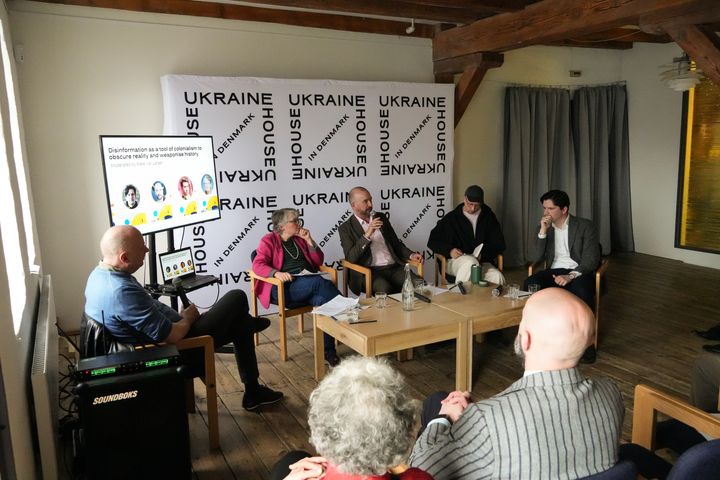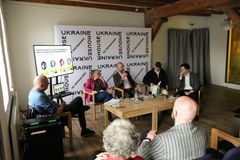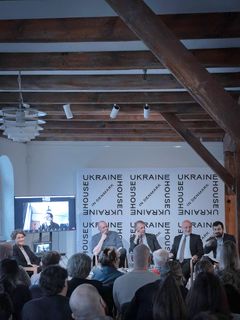“We need to insist that Russians deal with their history and that they move on from their colonial past.” Decolonising Mindsets for Security in Ukraine and Europe Forum at the Ukraine House in Denmark
6.5.2024 12:25:40 CEST | Ukraine House in Denmark | Pressemeddelelse

Copenhagen, Denmark - On Friday, April 26th, Ukraine House in Denmark in partnership with the Danish Institute for International Studies and the Embassy of Ukraine in Denmark hosted a forum that brought together experts on disinformation and decolonisation from Denmark, Ukraine, Germany, Georgia, and the Chechen Republic of Ichkeria to delve into the critical issues surrounding Russian colonialism and its impact on international relations today. The forum was moderated by Niels Ivar Larsen of Information.dk. The event was opened by the Ambassador of Ukraine to Denmark, Andriy Yanevsky, and the chair of the Ukraine House in Denmark Nataliia Popovych.
The first panel, featuring Maksym Eristavi, a journalist and writer, author of “Russian Colonialism 101”, Flemming Splidsboel Hansen, Senior researcher at Danish Institute of International Studies, Mette Skak, Associate professor at the Department of Political Science at Aarhus University, and Yevgeniy Golovchenko, Tenure Track Assistant Professor at the Department of Political Science and SODAS at the University of Copenhagen, illuminated how disinformation serves as a potent weapon for perpetuating colonial narratives and distorting historical realities. The war in Ukraine was framed as fundamentally a colonial war, with Russia employing rhetoric aimed at denying Ukrainian identity, reminiscent of imperial ideologies. The resurgence of Russian neo-imperialism has brought Eastern Europe's history of colonialism to the forefront of global discourse. Russia's disinformation strategy thrives on blending leftist and rightist ideologies, enabling it to manipulate diverse audiences worldwide.
This discussion was followed by the presentation of the work "Multidimentional Ruscism" by a group of authors including Volodymyr Ogryzko, former Minister of Foreign Affairs of Ukraine, Valeri Chechelashvili, former Ambassador of Georgia to the Russian Federation, Sergej Sumlenny, Managing Director at the European Resilience Initiative Center, and Usam Basayev, Ichkerian activist. This panel tackled the menacing rise of ruscism, as a form of Russian fascism and its implications for regional security. Ruscism represents an existential threat, rooted in historical revisionism and a quest for expansionism akin to fascism. Russian colonialism operates through the systematic erasure of indigenous cultures and historical truths, posing a grave challenge to Ukraine and neighbouring regions. The international community must unite to confront Russia's aggressive policies and compel acknowledgement of its colonial past.
Key takeaways emphasized by the panelists underscored the importance of amplifying indigenous narratives in countering Russian colonialism and disinformation. Education and awareness, as highlighted by Flemming Splidsboel Hansen and Mette Skak, are paramount in safeguarding against manipulation and fostering a deeper understanding of historical truths. Forcing Russia to reckon with its colonial history through international pressure, as advocated by Volodymyr Ogryzko and Valeri Chechelashvili, is essential for fostering genuine progress towards justice and reconciliation.
The forum concluded with a unified call to action: to confront Russian aggression, uphold historical truths, and champion the voices of those impacted by colonialism. It is only through collective efforts, as emphasized by all panelists, that we can pave the way for a more just and equitable future, free from the shadows of colonial oppression.
For more takeaways from the forum, please read below and follow our social media - :
—-----
Main insights from the Forum on Decolonizing Mindsets for Security in Ukraine and Europe:
-
Putinism mixes distinct left wing and district right wing reactionary elements. This works wonders for Russian disinformation strategy as it allows for both leftwing and rightwing audiences and politicians around the world to believe Russia is on their side. - Mette Skak
-
The UN definition of colonialism, created around 1960, states that you need salt water between the colonising nation and the colony. This conveniently excludes Russia and the Soviet Union from the definition. - Mette Skak
-
Empires exist not only on brutal force and land grabs, but also on mythology. Thus “gaslighting” becomes an important tool. We need to learn and recognise the key myths that have allowed the empire to exist for so long, and rule so many people so efficiently. - Maksym Eristavi
-
There are several Russian imperial myths, very well researched by indigenous scholars. Some examples: one is “Russian imperial innocence” - Russians believe they are not imperialist, but that they are on an important civilizing mission, no matter the opinions of those they want to “civilize” and that they make great sacrifices to be on that mission. - Maksym Eristavi
-
Second is that colonialism can only be Western, “white on white” colonialism doesn’t exist, thus Russia can not be a colonial empire. - Maksym Eristavi
-
The third is “you can learn about Russia only in Moscow”. Yet an empire can only be known and learnt about through the experiences of people who have been colonised, those who have intimate experience through colonisation. - Maksym Eristavi
-
The fourth is: “Russia is not an empire, because we started talking about it only in 2022”. What this conceals is a practice of erasing any indigenous knowledge everywhere Russia goes. - Maksym Eristavi
-
To exit the orbit of imperial gaslighting we must amplify indigenous stories, as every indigenous story that is told makes the empire look less glorious, less great, less missionary. - Maksym Eristavi
-
For former Russian colonies removing statues related to Russian colonial writers, leaders, etc. is about reclaiming our roots, remembering our history and rediscovering who we are. - Maksym Eristavi
-
An essential element of putinism is neo imperialism. There are billboards around Russia with a slogan “Russia never ends” – Flemming Splidsboel Hansen
-
We are not prepared for Russian weaponisation of history. If we go to the streets and ask people about the history of Ukraine or Eastern Europe in general, they would not know how to answer. Thus we can be very easily manipulated. – Flemming Splidsboel Hansen
-
We have a responsibility to educate ourselves, as the Western public, on those topics on a greater scale than it has been done, to not be manipulated. – Flemming Splidsboel Hansen
-
We also need to have a much greater variety of voices in academia. We need people from former colonies in academia, to have more than just Russian studies and Russian voices. – Flemming Splidsboel Hansen
-
Russians need to take a long and hard look at themselves and face their history. One thing they have not done after the fall of the Soviet Union is to deal with their past. They have blown it up, taking pride in some darker chapters. We need to insist that Russians deal with their history and that they move on from their colonial past. – Flemming Splidsboel Hansen
-
The bad news is that it is difficult to counter disinformation if it is entrenched in politics, as people use motivated reasoning. The better news is that on average fact-checking works but it is far easier to do so if the fact check is aligned with something they already believe in or at least doesn't contradict people’s partisan affiliations. - Yevgeniy Golovchenko
-
The greatest trap for us is to talk about the war in a way that invokes people’s partisan beliefs. We need to stay above party politics. - Yevgeniy Golovchenko
-
Russians weaponise the already existent, fair anti-Western and anti-American sentiment in South America and different African states to use for their imperial propaganda. - Yevgeniy Golovchenko
-
Russia is a country that is always trying to look better than it is in reality. We can start with the name: Russia. You will not find this name on European maps until the 19th century. Yet they claim to have a history of over 1000 years long. - Volodymyr Ogryzko
-
The main "value" that Russia brings to the lands it occupies, as we see, is total destruction. - Volodymyr Ogryzko
-
The two great pillars on which the Russian population currently exists, starting from the 14-15th century when the Muscovite tsardom was founded, are lying and fear. And both of those aspects are interconnected: you lie because you fear and you fear because you are lying. And unfortunately, that does not seem to change century to century. - Volodymyr Ogryzko
-
Ruscism is Russian fascism. A totalitarian ideology like German nazism, Italian fascism, Soviet communism. Analysing ruscism with Umberto Eco’s framework for fascism, we discovered that both are similar in being ideologies of expansion and death. - Volodymyr Ogryzko
-
We should stop Russia before Russia stops us. Security is not about concessions or negotiations, but about a tough stance the West must take. Let’s not repeat our past mistakes. - Volodymyr Ogryzko
-
Ruscism is a manifestation of an attempt to deprive a neighboring nation of a right to existence. This is the current Russian policy and a policy of fascism. - Valeri Chechelashvili
-
With the current Russian occupation of approximately half of the Georgian coastline and the occupation of regions in Ukraine close to the Black and the Azov seas, Russia became a great threat to the entire current Black sea security system. - Valeri Chechelashvili
-
As the Georgian diplomatic corps, since the Russian invasion of two Georgian regions we tried to explain to our partners that this invasion is not an exception from the Russian policy towards its neighbors but an extreme manifestation of the conventional Russian policy in the region. Unfortunately we didn’t succeed then. - Valeri Chechelashvili
-
Usual relations and business as usual continued after the Russian invasion of Georgia. Russia will never stop until consolidated efforts of the international community will force it to accept reality. – Valeri Chechelashvili
-
We must defeat Russia all together, in Ukraine. Otherwise it will be very difficult to create a new and sustainable security network both globally and in particular in the Black sea region. – Valeri Chechelashvili
-
Russian colonialism is a settlers’ colonialism, unfamiliar and thus less discussed and visible to Western academia: you come to a country, you occupy it, you kill as many of the people as you can, especially the intellectual elite. Then you destroy the culture, destroying monuments, renaming cities, teaching only the Russian language, and you appropriate. Then you state those people never existed. - Sergej Sumlenny
-
Another example of colonial Russian colonial policies is the current kidnappings of Ukrainian children. They have done the same in the 1930s, kidnapping children of the indigenous people of the Northern part of the Ural mountains, the Khanty and Mansi. - Sergej Sumlenny
-
There is a problem with typical Western discussions about the topic of Ukraine: this topic always has to be discussed with participation of the Russians. In an ideal case, the panel is composed of a professor, a neutral artist with a “humanistic perspective”, a Russian who is “anti-Putin” yet states that Ukrainians are too emotional to partake, and no Ukrainians. - Sergej Sumlenny
-
That is how colonialism functions: you practically silence the oppressed and present the discussion about them with those whom you respect as equals, which in this case are exiled Russians. Ukrainians are discarded as too emotional and too involved, and too unaccepting of Russians. All the typical steps, in fact, used to silence women. - Sergej Sumlenny
-
Neither the German nor the Japanese societies would be as democratic and open as they are now if they had not been defeated and forced into an unconditional capitulation in the Second World War. So anyone who wishes Russia well, should wish it to be defeated into an unconditional surrender. Otherwise, history will repeat. - Sergej Sumlenny
-
Since the Second Russian-Chechen war, in the human rights organisation where I am working we have been compiling a registry of Russian war crimes, so that the involved personnel could be brought to court. Currently, we are also working with Ukrainian human rights organisations for the same purpose. – Usam Basayev
All speakers kept consistently to one message: Russian war of aggression against Ukraine is a colonial war, and Russia is determined to destroy Ukraine as a nation. Until recently Eastern Europe has generally been excluded from the history of global colonialism and decolonisation. With Russia’s resurging neo-imperialism, however, this framework is being brought to the foreground. Moreover, it is crucial for the people in the West to amplify indigenous voices to address Russian colonial narratives and protect themselves against Russian disinformation. For Russia itself to decolonise, it must be forced by the international political community to defeat at the Ukrainian battlefield and to the consequent acceptance of their colonial history.
As expressed by Niels Ivar Larsen, "Unlike Western colonial states, Russia never formed a nation state, but was born as an empire. In order for Russia to become a nation state and as a democracy it must rid itself of its colonial mentality. This means that for Russia to become itself it must lose this war."
"With this Forum we have only scratched the surface of the lack of knowledge about russian imperialism and neoimperialism and the threat it represents for security in Europe and the world. We also have noted all open questions that compel us to bring forward more Ukrainian voices and efforts to educate about Ukrainian history and culture as well as vision of the future. We will be joining efforts with all experts who like us believe in the need of Ukrainian Studies as part of the curriculum of Danish Universities and creating more opportunities for Danish and Ukrainian scholars to research history and help everyone make better informed decisions about the future," concluded Nataliia Popovych, chairperson of Ukraine House in Denmark.
Billeder
Følg pressemeddelelser fra Ukraine House in Denmark
Skriv dig op her, og modtag pressemeddelelser på e-mail. Indtast din e-mail, klik på abonner, og følg instruktionerne i den udsendte e-mail.
Flere pressemeddelelser fra Ukraine House in Denmark
Ukraine House in Denmark Opens “Voices of Dignity: Literature of Resistance” Exhibition – A Century of Ukrainian Cultural Defiance20.2.2026 10:49:04 CET | Presseinvitation
On February 23, 2026, Ukraine House in Denmark opens its new exhibition “Voices of Dignity: Literature of Resistance” — an exploration of how Ukrainian literature has functioned not only as art, but as an act of resistance across the twentieth and twenty-first centuries. It is a tribute to the Ukrainian literary voices who were persecuted or silenced under imperial and totalitarian regimes, those who were killed as a result of Russia’s full-scale invasion, and those who continue to write under the conditions of war.
Nobelprismodtager, danske stjerner og ukrainske forfattere markerer fireåret for krigen i Ukraine med storstilet solidaritetsaften på Det Ny Teater13.2.2026 12:43:20 CET | Presseinvitation
Den 22. februar 2026 inviterer Ukraine House in Denmark, Dansk Kulturinstitut og Det Ny Teater til ”Ukrainske Stemmer – historier om frihed”, en solidaritetsaften for Ukraine på tærsklen til fireåret for Ruslands fuldskalainvasion. På scenen kan bl.a. opleves den ukrainske nobelprismodtager Oleksandra Matviichuk, den danske verdensstjerne Nikolaj Coster-Waldau, Bodil Jørgensen, Ellen Hillingsø, Christine Albeck Børge, et 26 personers stort kammerorkester, samt en række ukrainske kunstnere.
Nobel Prize winner, Danish stars and Ukrainian writers mark the fourth anniversary of the war in Ukraine with a solidarity evening at Det Ny Teater30.1.2026 12:48:22 CET | Presseinvitation
On February 22, 2026, Ukraine House in Denmark, the Danish Cultural Institute and Det Ny Teater invite you to “Ukrainian Voices – Stories of Freedom”, a solidarity evening for Ukraine on the eve of the fourth anniversary of Russia’s full-scale invasion. On stage, you can experience, among others, the Ukrainian Nobel Prize winner Oleksandra Matviichuk, the Danish world star Nikolaj Coster-Waldau, Bodil Jørgensen, Ellen Hillingsø, Christine Albeck Børge and a number of Ukrainian artists.
Udstillingen »My Body Is a Battlefield« udsat for hærværk i København23.12.2025 12:39:22 CET | Nyhed
København, 23. december 2025 – Ukraine House in Denmark (UHD) og Spilne Art fordømmer på det kraftigste hærværket mod skulpturerne fra udstillingen »My Body Is a Battlefield. Copenhagen« [Min krop er en slagmark, København] af den ukrainske kunstner Mariia Kulykivska. Udstillingen, der var organiseret af Spilne Art i samarbejde med Ukraine House i Danmark, blev udsat for hærværk i fuldt dagslys den 22. december 2025 i nærheden af UHD's lokaler.
Exhibition “My Body Is a Battlefield.” vandalised in Copenhagen23.12.2025 11:27:49 CET | Nyhed
Copenhagen, 23 December 2025 — Ukraine House in Denmark (UHD) and Spilne Art strongly condemn the vandalism of outdoor sculptures from the exhibition “My Body Is a Battlefield. Copenhagen” by Ukrainian artist Mariia Kulykivska. The exhibition, organised by Spilne Art in cooperation with Ukraine House in Denmark, was vandalised in broad daylight on 22 December 2025 near the premises of UHD.
I vores nyhedsrum kan du læse alle vores pressemeddelelser, tilgå materiale i form af billeder og dokumenter samt finde vores kontaktoplysninger.
Besøg vores nyhedsrum

